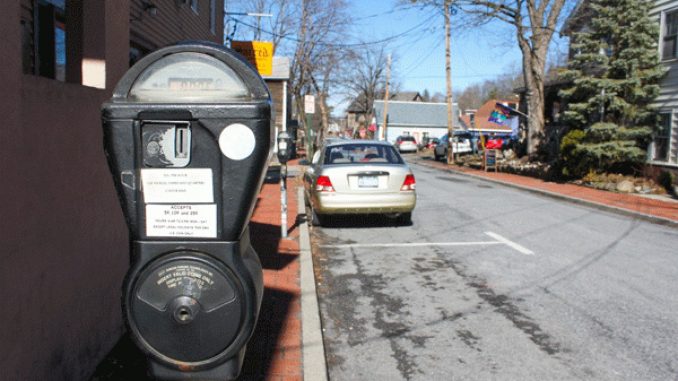
The only thing more time-consuming than driving from one side of Main Street in New Paltz to the other is finding a parking spot in between. However, navigating these issues pose numerous financial and structural challenges.
On Oct. 16, village trustees discussed ways to cultivate a pedestrian-friendly environment while welcoming much-needed tourism for the local economy. Trustees addressed financial and environmental necessities of the Village’s parking policies. They also explained efforts to increase parking availability and alternative avenues for collecting fees.
In the last year, the Village’s decision to abolish free Sunday parking has been a point of contention among residents. Village Mayor Tim Rogers explained that since the Village receives no revenue from bed taxes for rented rooms, and less than a cent from sales tax, this was a necessary move. On top of that, meter fees and parking tickets are the second and third highest sources of revenue from the town under property taxes.
Most parking meters in the Village charge 50 cents per hour, excluding meters near the post office which only charge 25 cents an hour. The Village also charges $20 for expired meter tickets. Residents are also able to buy
a parking permit for the Village Hall lot at a fee of $15 per month. Compared to Saugerties, New Paltz fees only surpass their expired meter fees by $10. However, Saugerties pays a police enforcement officer to patrol the meters, which ultimately falls on taxpayers to fund. Kingston’s fees are slightly higher, charging 75 cents per hour and issuing $25 expired meter tickets. There are currently no plans in the Village to alter parking fees.
“If we didn’t have meters, people would park and leave their car all day,” said Village Trustee Michele Zipp. “Years ago I was a student [at SUNY New Paltz] and I parked my car on N. Front Street for days and days.”
The necessity of said fees lie in balancing the costs of maintenance and the revenue gained from parking spots. Rough estimates show that parking spot maintenance and enforcement, including plowing and paving, costs the Village $400 per spot, totaling at $104,000 per year overall. The Village pays one full-time meter monitor, Monday through Friday, roughly $18.69 an hour and two part-time employees $17 an hour for the weekend.
Environmental concerns are also factored into the flow of parking in the Village. Trustees were worried that lack of spots would mean cars are forced to drive in circles around town looking for space, increasing vehicle emissions in the air. Rogers explained that a number of spots have been added to address this concern, including 70 new spots in the Sojourner Truth Park, additional space at the Empire State Trailhead and plans to create nine new spots in the postal office lot.
More changes will come with plans to purchase new pay stations for the Plattekill and post office lots. Meters are phasing out due to costly maintenance fees and issues with the machines themselves. Although the pay station on Plattekill was replaced earlier this year, Rogers explained that the device proved to be problematic at best.
Plans to introduce an app for parking payment brought up issues with data privacy and surcharges. Rogers explained that the surcharges necessary to process credit card payments would hike fees by 40 cents. Additionally, the last company they considered wanted full control to use data regarding who parks where and at what time.
“In this age, data is so valuable and the Immigration Enforcement Agency and Facebook uses data for questionable things,” Rogers said. “If we’re entering into an agreement with a business, we do not want to give them free access to our residents’ data.”
Another developing source of parking revenue may come from the sale of the Village-owned lot behind Bistro and Moonlight Cafe. Rogers said that the highest bid for the lot is currently $113,000, all of which would be reintegrated into parking development.
While no concrete plans for the future have been vocalized by trustees, they will surely grapple with various ideas to improve parking conditions.

